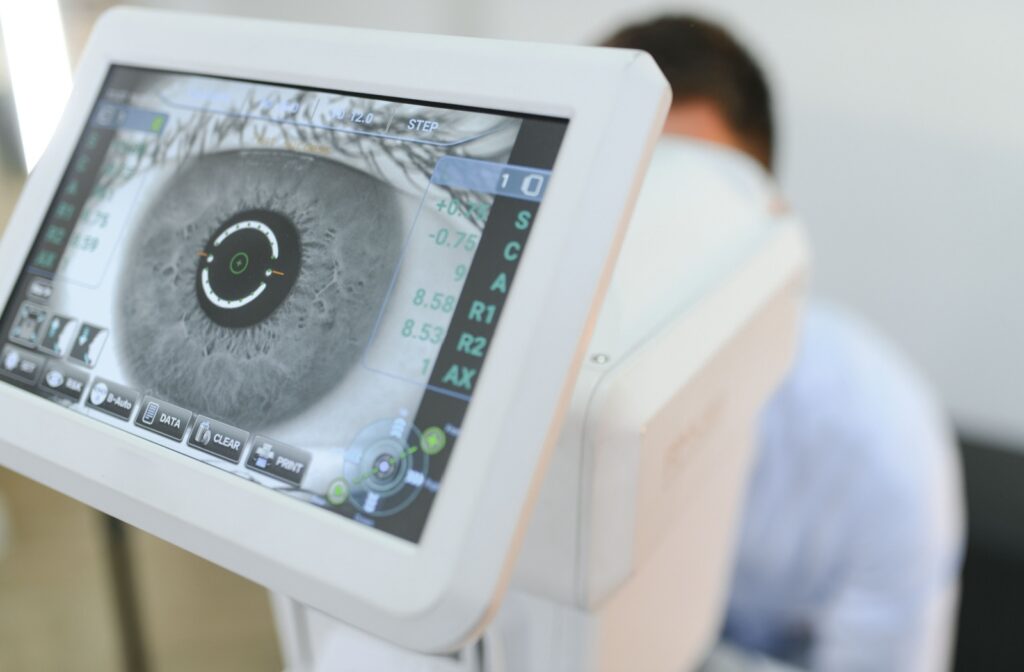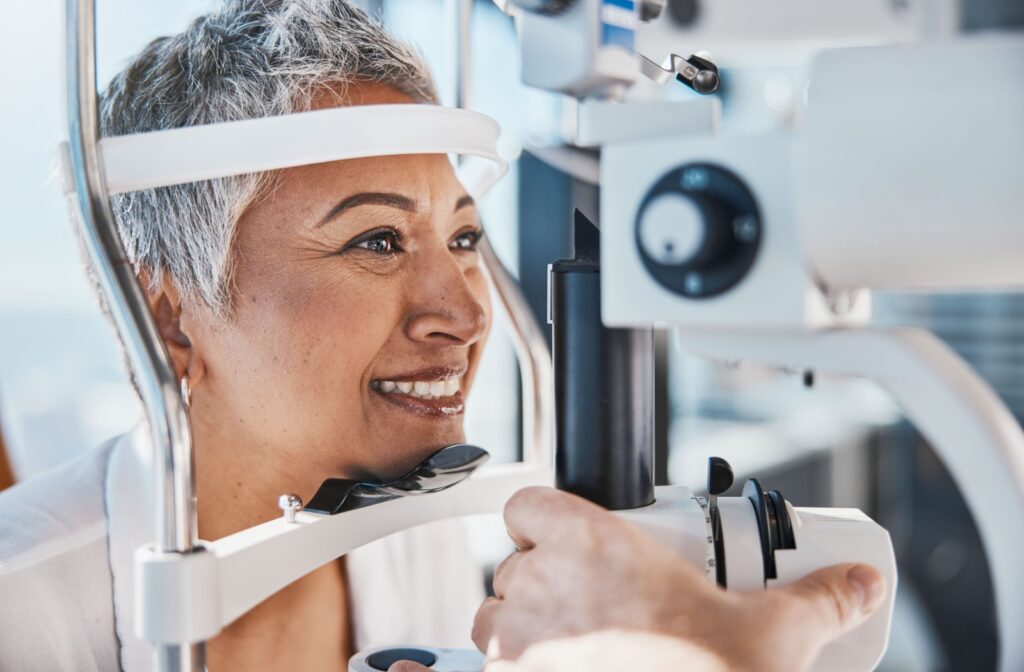Our sight allows us to see the world around us, which is why regular eye exams are important. Eye exams are not just about getting a prescription for glasses; they also play a major role in maintaining your overall health.
Regular eye exams can detect vision problems and other health issues early on, working as preventive care. However, concerns over the cost of eye exams are common.
In Ontario, the Ontario Health Insurance Plan (OHIP) provides coverage for eye exams for those who are eligible. OHIP does not cover some recommended testing like retinal imaging.
What Does OHIP Cover?
Eye care is a vital part of healthcare in Ontario, but understanding what OHIP covers can be confusing. There is different coverage for different age brackets and scenarios.
Coverage for Children
For children aged 19 or younger, OHIP covers the annual eye exam. We recommend digital retinal imaging for children over 4 years of age to help monitor eye health. However, there is an additional fee for imaging, which OHIP does not cover.
Coverage for Adults
For adults aged 20 to 64, OHIP does not cover regular eye exams. However, there are exceptions for adults with certain medical conditions. Adults living with potentially sight-threatening conditions are eligible for an OHIP covered an annual eye exam.
- Diabetes
- Glaucoma
- Cataracts
- Retinal disease
- Corneal disease
- Optic nerve pathway disease
- Uveitis
- Patients taking certain medications
- Sudden onset of strabismus
In addition to an annual eye exam, OHIP can cover the cost of 2 follow-up appointments related to the covered medical condition.
We also recommend retinal imaging as part of a comprehensive eye exam, which OHIP does not cover.
Coverage for Seniors
OHIP provides coverage for an annual eye exam for seniors aged 65 and up if they have one or more of the conditions covered for adults 20–64. If they do not have any of these conditions, they are eligible for an eye exam once every 18 months. This coverage does not include any additional testing, like optical coherence tomography (OCT) and retinal imaging. Annual eye exams are recommended for all seniors to ensure any changes to eye health are identified early.
What Does OHIP Not Cover?
For all seniors, adults, and children over 4, there is a fee for imaging, which is not covered by OHIP. Digital imaging is a recommended part of a regular eye exam to help monitor any conditions that may be damaging your retina.
OHIP does not cover eyeglasses, contact lenses, or laser eye surgery.
Additionally, OHIP does not provide coverage for:
- Dry eye treatments
- Testing, such as retinal photography and scans
- Contact lens fittings
Knowing what to expect financially when going into an eye exam will help you avoid any surprises.
How Much Does an Eye Exam Cost in Ontario?
The cost of an eye exam in Ontario varies depending on the clinic. Most optometry practices stay within a similar price range to remain competitive.
Factors to Consider
While it may be tempting to choose the cheapest option, it is essential not to compromise on the quality of care—they are crucial for our eye health and overall well-being.
Eye exams can detect issues such as cataracts and age-related macular degeneration (AMD), which are 2 of the leading causes of blindness in Canada. Digital imaging can give a more thorough examination of your eye health, helping detect conditions like glaucoma and retinal detachment. Investing in a comprehensive eye exam can detect potential issues early and prevent future problems.
Alternative Coverage Options
If you do not qualify for OHIP-covered eye exams, several alternative options are available.
Private Health Insurance Plans
Many private health insurance plans provide coverage for eye exams, eyeglasses, and contact lenses. Some popular plans include:
- Manulife
- Sun Life Financial
- Blue Cross
- Great-West Life
Government Programs
Several government programs offer assistance for eye care services, including:
- Ontario Disability Support Program (ODSP)
- Ontario Works (OW)
These programs can help cover the costs of eye exams, eyeglasses, and other essential eye care services for eligible individuals.

Recommended Eye Exam Frequency
According to the Canadian Association of Optometrists, there are several different frequencies for eye exams, depending on age and other factors.
Infants & Toddlers
Infants and toddlers should have their first eye exam at around 6 months of age. We recommend annual exams to help detect vision problems early, prevent future issues, and promote proper visual development. Scheduling annual exams for infants and toddlers, which are covered by OHIP, also help them (and their parents) grow accustomed to routine testing.
School-Age Children
Children aged 4 to 19 should have an eye exam every 12 months. During this period, their eyes are constantly developing, and regular eye exams can help detect and address any vision issues that may impact their academic performance and overall well-being.
Adults
Adults aged 20 to 64 should still have eye exams once every 12 months. Many insurance companies can cover annual eye exams. Frequent eye exams can help detect early signs of eye diseases and other health issues, allowing for timely intervention and treatment.
Seniors
Seniors aged 65 and older should have an eye exam once a year. Regular eye exams are essential for detecting age-related vision changes and other health conditions that may affect vision.
Prioritize Preventive Care
While not everyone is eligible for OHIP-covered eye exams, attending regular eye exams is crucial for detecting potential issues early and promoting overall well-being. Even if you do not qualify for OHIP coverage, alternative options are available to help cover the costs of eye care services.If you have any questions about your coverage or need assistance booking your next eye exam, don’t hesitate to contact Avenue Optometry & Vision Therapy. Our team is here to help you care for your eyes and overall health.




